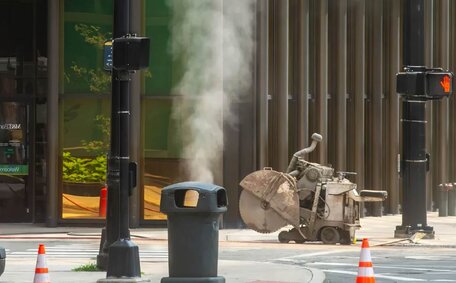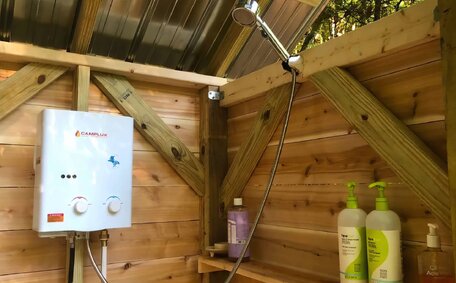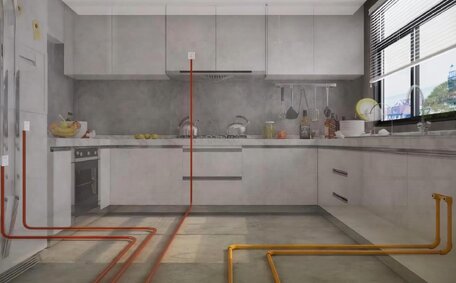
How To Move A Gas Meter
Need your gas meter relocated? You can’t move it yourself - contact your supplier to arrange for a gas engineer to reposition it safely. Charges may apply depending on circumstances.
Read MoreLimescale, or calcium buildup in pipes, originates from accumulated minerals, notably calcium and magnesium, found in hard water. Over time, these mineral deposits harden and create significant issues.
Limescale accumulation can lead to impaired water flow and reduced water pressure. Such restrictions can impair pipe systems, making them work harder to deliver water, thereby increasing strain and energy costs. Hardened calcium deposits may degrade seals and gaskets, causing leaks that can jeopardize property integrity.
Beyond flow and leaks, calcium buildup in your pipes affects system health and performance. Calcium buildup around your pipes, particularly at sink faucet aerators, can limit water pressure. in extreme scenarios, calcium lumps can render pipes broken or blocked, creating significant obstruction from within.
Limescale in drains can also disrupt toilet tank sealing and impair bowl water flow.
Calcium and mineral buildup in your plumbing pipes can also stem from the continuous use of hard water. Hard water can lead to high mineral levels in your home, which brings about problems your typical cleaning might struggle to manage without caustic solutions. As water flows through pipes, these minerals dissolve and can firmly attach into pipe surfaces, showing how mineral concentrations are building up as time passes.
Over time, a coating of limescale made up of these minerals builds up inside pipes and restricts water flow. Areas with very hard tap water, like Menai in Sydney, experience heavier limescale accumulation that causes major blockages.
Other factors may also cause issues, and such issues can arise from natural corrosion of pipes that allows minerals to leech into the water system, flaws in water softening systems, and temperature fluctuations.
Home plumbing systems may suffer from hard water containing excessive dissolved minerals like calcium and magnesium. Mineral accumulations from hard water can restrict fixtures and appliances by causing buildup in pipes.
Hard water deposits inside pipes reduce water flow and pressure, potentially straining appliances and fixtures. Fixtures like faucets and showerheads that are part of the water supply system will have decreased output and may fail prematurely. In particular, hard water leads to calcium buildup in pipes and scale accumulation in water heaters, reducing heating efficiency and capacity.
When hard water infiltrates a building’s water supply, it can compromise plumbing quality and affect the taste and quality of food and beverages. Dishes and glasses may develop unsightly spotting from mineral residue, proof of what can seep into your sink and housewares. When cooking oil, sanitary products and other ingredients interact with hard water containing calcium buildup, the result can be longer cooking times and compromised flavours.
Laundry washed in hard water may need a wash with baking soda vinegar to get rid of the dull, rough feel and soap excess. Minerals in residual water can leave a sticky grime, which vinegar and baking soda can effectively remove. Overall, hard water compounds major efficiency, aesthetic, and comfort issues by affecting your water usage around the home.
Pipe relining is a robust solution that preserves the integrity of various pipe materials, such as clay, concrete, and metal, while avoiding significant demolition and disruption.
Pipe relining uses a resin-saturated liner to eliminate calcium buildup in clogged pipes and restore flow. Using controlled air pressure, the liner material is moulded and cured into a smooth, jointless inner pipe wall that tackles your blocked waterways, ensuring the drain is clear while maintaining pipe diameter.
Pipe relining provides clear indicators for diagnosing blocked drain problems and offers numerous advantages over traditional pipe replacement options:
Pipe relining ensures calcium scale and other deposits cease to threaten your plumbing, benefiting even previously untreated pipes. The sleek epoxy coating eliminates concerns for future calcium buildup, a boon for older pipes, without the necessity of chemicals or frequent maintenance.
Menai’s residential and commercial clients can trust pipe relining as a cost-effective solution that protects their properties from limescale.
With pipe relining, we can install a barrier that is an effective solution to remove existing calcium buildup while preventing future scale accumulation. The seamless epoxy barrier coats the iron steel interior walls of pipes with an ultra-smooth surface that water simply flows over.
The smooth surface of relined pipes prevents roughness and pitting, inhibiting limescale adherence and hardening. The glasslike coating is also engineered to resist high temperance and chemicals, which can extend the lifespan of your pipes significantly.
Key benefits of pipe relining for tackling calcium deposits:
The installation starts with a manual clean and high-pressure jetting to remove calcium deposits, prepping pipes for the epoxy. The smooth, unbroken liner adapts seamlessly across the interior, reducing clogs like a drai snake, offering reliable protection from sewer and stormwater issues.
Pipe relining solves the calcium scale issue in sewer pipes for the long term, offering reliable service without extensive renovation. Reach out to Menai Plumbing to discover more about this trenchless repair option for your drain lines.
The pipe relining process consists of specific key steps:
For those who value efficiency and minimally invasive methods, pipe relining is a cost-effective water management solution. It preserves your pipe capacity without the major demolition of traditional replacement methods. For sewer line assessment and pipe relining suitability, contact Menai Plumbing for expert advice.
Professional pipe relining provides immense benefits in addressing calcium buildup in pipes. As a modern, minimally invasive structural repair method, it provides immediate and long-term relief against limescale accumulation and corrosion damage.
The key advantages of pipe relining for calcium removal include:
Pipe relining involves proactive steps such as CCTV inspections, manual scrubbing, and high-pressure water jetting to clear old calcium deposits, preparing the pipes for the epoxy.
Our Blueline selection delivers a durable, corrosion-proof lining that serves as a proactive shield against calcium invasions. With a single trenchless repair, both present and future scale buildup issues are tackled for good.
Residential and commercial properties in Menai can rely on pipe relining for enduring protection against limescale. Contact our family owned specialist team at Menai Plumbing to learn more about this innovative solution for calcium removal.
Aspect Pipe Relining, signs of a blocked drain, Pipe Replacement
| Time | Much faster with minimal disruption, typically 1-3 days | Very slow, with homes rendered unlivable for weeks |
| Cost | As low as 30% of replacement cost | Extremely expensive, averaging $6,000 to $12,000 |
| Longevity | 10 to 50 year expected lifespan with warranties | Depends on pipe material, averages 30 to 90 years |
| Environmental Impact | Minimal, trenchless method preserves infrastructure | Major, discarding old pipes and using new materials |
Pipe relining stands out as the superior choice for addressing calcium buildup and other plumbing concerns in Menai, compared to complete drain replacement. With decreased costs and disruption plus long-term durability, pipe relining enables effective maintenance; keeping everything flowing without major renovation.
Engage with Menai Plumbing specialists to explore limescale removal with our pipe relining services, an alternative to traditional replacement.
Several preventive measures can secure the enduring results of pipe relining for calcium removal:
Installing water softener units reduces mineral content, preventing limescale buildup in plumbing systems due to hard water. Water softeners are instrumental in helping protect your pipes from scale and corrosion by transforming hard water into soft water.
Regularly flushing your drains every 3-6 months can wash away sediment and minerals, preventing significant deposits. Just as one wouldn’t put cat litter down a toilet, water pour from taps running hot and cold for 5 minutes also maintains flow.
Wipe down faucets and showerheads to remove soap scum and surface mineral residue, ensuring water flow remains unobstructed before residues harden. Use a descaling solution that can break down internal buildup periodically.
Have a professional plumber inspect your relined pipes once a year using CCTV technology. This enables early detection of potential failures and preventative maintenance.
Attentiveness to these strategies guarantees that not just the sink drain, but the entire plumbing remains free from calcium scale.
A water softener system can help prevent mineral buildup by removing elements like calcium and magnesium from the water, thus protecting the pipes. They transform hard water into soft water to prevent scale buildup.
Regularly scheduled to pour boiling water down the drain can effectively clear out sediment and prevent hard scale formation in pipes. Simply run hot and cold taps for 5 minutes to maintain flow.
Regularly wiping fixtures and appliances with lemon juice mixtures clears blocked pores and removes surface mineral residue. Descale interiors periodically.
For minor calcium deposits on fixtures, wondering how remove calcium buildup? A paste of baking soda and vinegar can remove calcium deposits effectively when applied and set overnight.
Have a skilled Menai Plumbing service professional, adept in both plumbing and electrical plumbing systems, inspect relined pipes annually using CCTV technology to catch potential failures early.
Staying vigilant with these measures ensures ongoing protection against calcium scale. Contact our specialists anytime for professional drain maintenance or repairs to tackle stubborn buildup issues.
Need your gas meter relocated? You can’t move it yourself - contact your supplier to arrange for a gas engineer to reposition it safely. Charges may apply depending on circumstances.
Read MoreInvesting in a solar hot water system can save up to 75% on water heating costs. With great returns and added home value, solar hot water can be a smart choice over electric or gas heaters. Contact us to see if it’s the right investment for your home.
Read MoreWhile natural gas and propane can both power appliances in your home, they have notable differences when it comes to BTU output, infrastructure, safety, cost and more. Understanding these key contrasts will help you determine which is better for your specific needs.
Read MoreMenai, 2234 NSW
We will call back as soon as possible.




